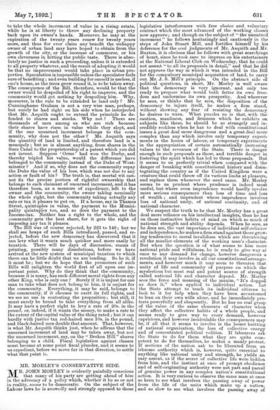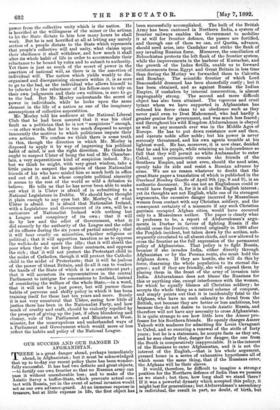MR. MORLEY'S CONSERVAD.VE SIDE.
MR. JOHN MORLEY is evidently painfully conscious that many of his party are getting ahead of him in the advocacy of a policy which, whether it be so or not in reality, seems to be democratic. On the subject of the Labour laws he is avowedly and strongly opposed to those legislative interferences with free choice and voluntary contract which the most advanced of the working classes now approve ; and though on the subject of "the unearned increment" he follows hesitatingly and cautiously in the steps of John Stuart Mill, and fortifies himself by his deference for the cool judgments of Mr. Asquith and Mr. Buxton, it is obvious that he follows with great searchings of heart, since he took care to impress on his entertainers at the National Liberal Club on Wednesday, that he could not assent "to all its proposals in detail," and that he did not approve the way in which it was intended in the Bill for the compulsory municipal acquisition of land, to carry out Mr. J. S. Mill's principle. On the abstract side of political questions, in short, Mr. Morley is well aware that the democracy is very ignorant, and only too ready to propose what would both fetter its own free- dom and undermine its own prosperity. And wherever he sees, or thinks that he sees, the disposition of the democracy to injure itself, he makes a firm stand, without showing any fear of resisting the democracy he desires to warn. What puzzles us is that, with the caution, manliness, and firmness which he exhibits on. subjects like these, he should be so strangely and in- credibly reckless when he has to deal with constitutional issues a great deal more dangerous and a great deal more complex than any which involve only temporary experi- ments in the hours of labour, or temporary experiments in the appropriation of certain automatically increasing values to the revenues of the State. There is danger enough in such proposals as these, and terrible danger in fostering the spirit which has led to these proposals. But it seems to us perfectly trivial when compared with the danger of breaking with constitutional history and disin- tegrating the country as if the United Kingdom were a creature that could throw off its various limbs at pleasure, and replace them whenever the need came. Mr. Morley seems to us prudent where prudence is indeed most useful, but where even imprudence would hardly involve more serious consequences than loss of time and loss of wealth ; and imprudent where imprudence involves loss of national unity, of national continuity, and of national character.
We suspect the truth to be that Mr. Morley has a great deal more reliance on his intellectual insights, than he has on those instinctive habits of mind on which so much of national strength and ability depends. When he sees, as he does see, the vast importance of individual self-reliance and independence, he makes a firm stand against those grow- ing tendencies to moral invalidism which are threatening all the manlier elements of the working man's character. But when the question is of what seems to him mere national pride and wilfulness, he is ready to give way at once to any demand for change, however dangerous a revolution it may involve in all our constitutional arrange- ments, and however much it may seem to threaten that unity of life and community of purpose on which the mysterious but most real and potent source of strength called national life and character depend. Mr. Morley sees the force and meaning of the maxim, "It's dogged as does it," when applied to individual action. Let the State attempt to teach its individual citizens to look to it for help when they have been accustomed to lean on their own wills alone, and he immediately pro- tests powerfully and eloquently. But he has no real grasp of the value of the same elements of character when they affect the collective habits of a whole people, and seems ready to give way to every demand, however capricious, and however incalculable the consequences may be, if all that it seems to involve is the looser knitting of national organisation, the loss of collective energy and of concentrated political volition. If labourers ask the State to do for them what they are quite com- petent to do for themselves, he makes a manly protest. If sections of the nation ask to be liberated from an irksome authority which is, however, quite essential to anything like national unity and strength, he yields an easy assent, as if the secret of collective life were hidden from him, and the instinct at once of prompt obedience and of self-originating authority were not part and parcel of genuine power in any complex nation's constitutional action. It is very curious to observe the same man at once so keen to see what involves the passing away of power from the life of the units which make up a nation, and so slow to see what involves the passing away of power from the collective unity which is the nation. He is horrified at the willingness of the miner or the artisan to let the State dictate to him how many hours he shall work. But he is not horrified at all at letting any unruly section of a people dictate to the State which represents that people's collective will and unity, what claims upon their obedience it shall withdraw, and how much it shall alter its whole habit of life in order to accommodate their reluctance to be bound by rules and to submit to authority. Yet there is just as much of the secret of power in the assertion of national will, as there is in the assertion of individual will. The nation which yields weakly to dis- organised and disorganising elements within it, is as sure to go to the bad, as the individual who allows himself to be infected by the reluctance of his fellow-men to rely on their own judgments and their own volition, is sure to go to the bad. But Mr. Morley understands the secret of power in individuals, while he looks upon the same element in the life of a nation as one of the imaginary assumptions of collective superstition. Mr. Morley told. his audience at the National Liberal Club that he had been assured that it was his chief fault as a politician that he is not " suspicious " enough, —in other words, that he is too much disposed to accept innocently the motives to which politicians impute their own actions. We confess we think there is some truth in this, though the direction in which Mr. Morley is disposed to apply it by way of improving his political habit of mind, is not the right direction. He thinks he ought to suspect Ulster of being the tool of Mr. Chamber- lain, a very superstitious kind of suspicion indeed. No; but we think he might, with very great wisdom, take a little pains to suspect the motives of those Nationalist friends of his who have misled him so much both in office and out of it, and in whose complete political sincerity it seems to the rest of the world so wild a delusion to believe. He tells us that he has never been able to make out what it is Ulster is afraid of in submitting to a National Legislature in Dublin. We should have thought it plain enough to any eyes but Mr. Morley's, of what Ulster is afraid. It is afraid that Nationalist Ireland, • with a Legislature and Government of its own, will be a caricature of Nationalist Ireland with nothing but a League and conspiracy of its own ; that it will • do by law and the edict of Government, what it -did recently by the authority of the League and the edict of its officers during the six years of partial anarchy; that it will bear cruelly on minorities, whether religious or political; that it will apportion taxation so as to oppress the well-to-do and spare the idle ; that it will shield the poor when they do not keep their contracts, and oppress the rich ; that it will not protect the Protestant child in the midst of Catholics, though it will protect the Catholic child in the midst of Protestants ; that it will be jealous of the power of Great Britain, and do all it can to weaken the hands of the State of which it is a constituent part ; that it will accustom its representatives in the central Parliament to intrigue for concessions to Ireland, instead of considering the welfare of the whole State,—in a word, that it will not be a just power, but will pursue those habits of perverse and shifty policy in which it has been training itself for these last ten years and more. Surely it is not very unnatural that Ulster, seeing how little of justice there has been in the Nationalist Party, and how much of cruelty and craft, should be violently repelled by the prospect of giving up the just, if often. blundering and clumsy, rule of the Parliament and Ministers at West- minster, for the unscrupulous and underhanded ways of a Parliament and Government which would. more or less reflect the habits and policy of the National League.







































 Previous page
Previous page